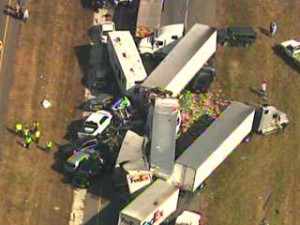Weather conditions at the time were also a factor with drivers reporting fog thick as “pea soup” and the speed limit on that stretch of highway was 70-mph with just about everyone driving at the maximum allowed by law. The combination of poor visibility and speed were definitely contributing factors and police were take all these things into consideration as they work toward identifying a single cause (if they can find one, and if there was one.)
A lot of attention has been paid to the dangers of distracted driving, and everyone understands the dangers of driving under the influence of alcohol (or at least they should) but in nearly every single fatal crash in the nation, year after year, speed is also involved. Drivers are usually traveling at speeds which are unsafe for the driving conditions, whether it is dark (at night), there are foggy roads or there is precipitation or icy/snowy roads.
Defensive driving is all about being cautious before you need to be. It’s easy to slow down when you see an accident in front of you, but it takes careful, safe pre-emptive actions to avoid being involved in an accident in the first place. It starts by watching your speed and driving in accordance with the conditions around you. If you don’t if you ignore safe driving practices in favor of getting where you are going just a few minutes earlier (which you will likely spend getting gas any way) you run the risk of being involved in a serious, perhaps fatal crash.
The choice is yours.

 Live Chat
Live Chat






